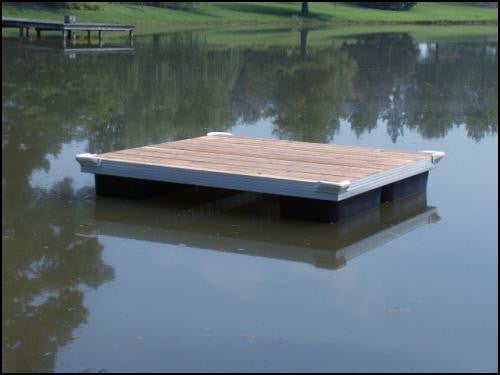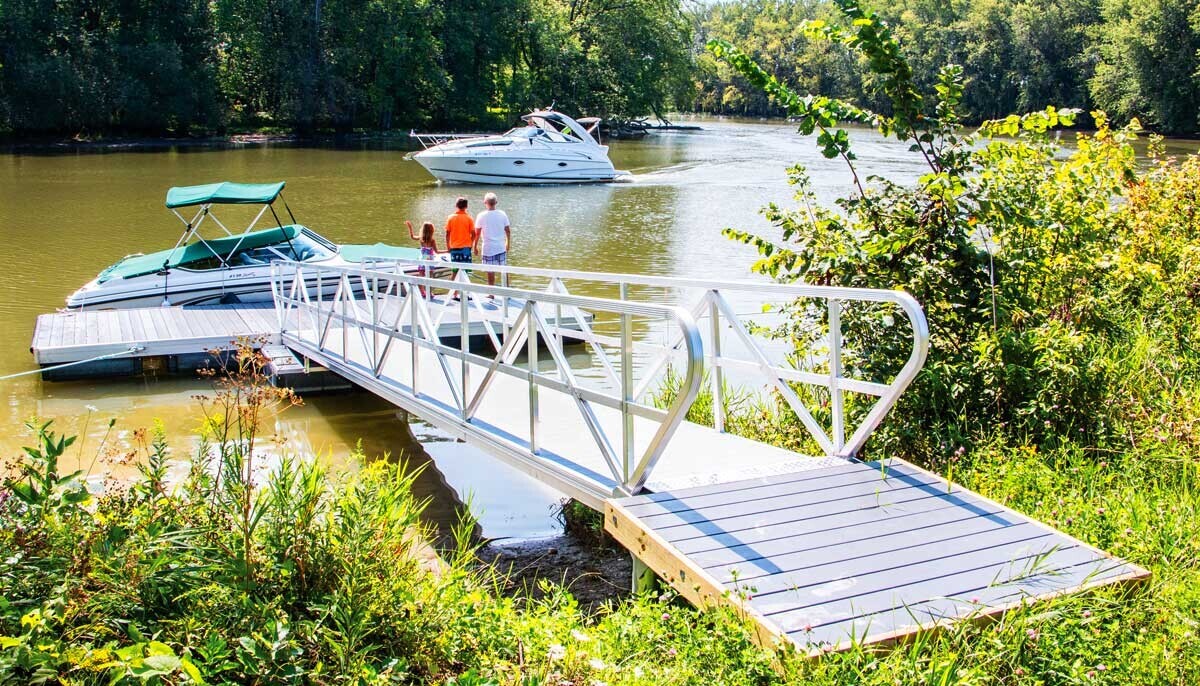Crafting Customized Solutions: Why a Floating Dock Builder is Vital for Unique Requirements
Crafting Customized Solutions: Why a Floating Dock Builder is Vital for Unique Requirements
Blog Article
Produce the Perfect Docking Service With Floating Docks
Floating docks present a flexible solution for a variety of maritime needs, adjusting seamlessly to varying water degrees and varied vessel kinds. As we discover the vital aspects that contribute to the efficiency of floating docks, a number of key aspects pertaining to security and upkeep will arise, raising inquiries about how to maximize your docking experience.

Advantages of Floating Docks
Floating docks offer various benefits that make them a perfect option for different maritime applications. Unlike taken care of docks, floating docks increase and fall with the trend, making sure constant accessibility for vessels.
Additionally, floating docks are commonly less complicated and quicker to install contrasted to traditional fixed structures. Their modular layout permits straightforward assembly and disassembly, facilitating maintenance and relocation when necessary. This adaptability is particularly beneficial for short-lived applications or in atmospheres where problems may transform.
Floating docks likewise often tend to be extra ecologically pleasant, as they reduce disruption to the seabed and bordering marine ecological communities. Their buoyant nature minimizes the risk of damage to marine life, advertising a healthier environment. These docks can be personalized to suit different vessel dimensions, making sure that they satisfy specific operational needs.
Ultimately, the mix of flexibility, simplicity of installment, and environmental factors to consider makes floating docks a very efficient option for a broad range of maritime requirements.
Selecting the Right Materials
Choosing the suitable materials for floating docks is important to make sure toughness, longevity, and stability. The selection of materials straight affects the dock's performance in various ecological conditions, consisting of exposure to water, sunshine, and prospective wear from aquatic website traffic.
Typical products made use of for floating docks include aluminum, wood, and high-density polyethylene (HDPE) Aluminum is lightweight, corrosion-resistant, and needs very little maintenance, making it a superb selection for durability. However, its initial price can be higher contrasted to various other materials.
Wood, while cosmetically enticing and supplying a standard look, can be at risk to rot and insect damage otherwise correctly dealt with. Utilizing pressure-treated timber or normally durable species like cedar or redwood can mitigate these issues.
HDPE is a popular selection due to its resistance to UV rays and chemicals, in addition to being eco-friendly. floating docks. It is light-weight and readily available in numerous colors, enabling for modification
Ultimately, the right product choice will depend upon details needs, consisting of budget plan, desired aesthetics, and environmental factors to consider. Careful assessment of these variables will certainly cause a resistant and successful floating dock service.
Design Factors To Consider for Security
When making floating docks, making sure stability is a basic facet that can substantially affect their capability and safety. Stability in floating dock design is influenced by different factors, consisting of buoyancy, weight distribution, and the arrangement of parts.
Weight distribution is critical; evenly distributing lots throughout the dock protects against tilting and boosts stability. Bigger layouts can use raised security, especially in harsh water conditions, while longer docks might need additional supports to prevent sagging.
An additional crucial consideration is the environmental influence, consisting of wave activity and wind. Integrating attributes such as sidewalls or skirting can aid minimize the effects of ecological pressures, maintaining security in unfavorable conditions. Ultimately, a mix of thoughtful design, product choice, and understanding of ecological factors will certainly generate a floating dock that meets both stability and security needs.
Installment Tips and Methods

Next, safeguard the necessary licenses and follow regional laws, which might dictate installment techniques and ecological factors to blog consider. Engage a qualified service provider experienced in floating dock installments if called for. Usage high-grade products designed for marine environments to enhance toughness and long life.
When placing the dock, align it alongside the coastline to promote very easy accessibility. Ensure that the anchoring system is robust, utilizing cinder block or helical supports to maintain the dock versus wind and wave activity. It's essential to represent seasonal water level variations, including possible ice activity in cooler climates.
Throughout the installation, ascertain the dock's floatation and stability before completing the anchoring. On a regular basis examine the setup for any kind of signs of wear or damage. By following these methods and ideas, you can accomplish a safe, practical, and aesthetically pleasing floating dock installation that satisfies your needs.
Upkeep and Care Standards
Keeping and caring for floating docks is vital to lengthening their life-span and ensuring risk-free use. Normal assessments ought to be conducted to recognize any indicators of wear, damages, or marine development. Seek splits, loose installations, or stained locations on the dock's surface, as these concerns can compromise structural honesty.
Cleansing is essential. Use a pressure washer to get rid of algae, barnacles, and debris, which can build up with time. For persistent growth, consider ecologically friendly cleaner that won't harm water life.
Additionally, check the mooring lines and anchors frequently to ensure they are totally free and safe from deterioration. Replace any type of torn or web harmed lines quickly to maintain security.
During extreme weather, such as storms or freezing conditions, take precautionary actions. Protect the dock with added mooring lines and, if practical, eliminate any detachable parts to stop damage.
Final Thought
In verdict, the execution of floating docks provides a reliable and versatile docking solution appropriate for different maritime applications. With proper installation and regular upkeep, floating docks can supply trustworthy and reliable docking experiences for a vast range of vessels.
As we check out the necessary components that contribute to the efficiency of floating docks, several vital factors pertaining to More hints stability and upkeep will certainly arise, elevating concerns about exactly how to maximize your docking experience. Unlike fixed docks, floating docks rise and loss with the tide, making sure constant access for vessels.When making floating docks, making sure security is an essential facet that can considerably affect their performance and safety and security. Stability in floating dock design is influenced by different aspects, including buoyancy, weight distribution, and the arrangement of parts. Eventually, a mix of thoughtful style, material selection, and understanding of environmental factors will certainly produce a drifting dock that satisfies both security and safety needs.
Report this page